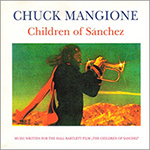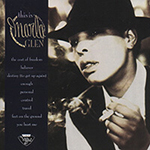I found it fascinating how sensitive this large loudspeaker system responded to the bowed nuances on the strings of the Stradivarius. Digging into these most fleeting details I usually associate with high-quality monitors optimized for micro detail, not giants. Well, it was time to throw some prejudices overboard. Admittedly hardly anyone will pursue this Acapella just for its finesse with subtlety. Desire to get grand and down should also factor. It's why Mighty Sam McClay who unfortunately passed far too soon was next. I would have loved to have attended one of his gigs. Missed opportunity? Not when you have blue Hyperion at the ready. The Swiss Beast had his "Too Proud" on its SSD. As soon as Rudolph cued up the track, I felt transported right in front of the stage, two or three arm's lengths away from the ingenious Bluesman. Did I mention the nonchalance whereby these horns scale up live SPL without any hint of unruly distortion? Of course we're served up all manner of attractions and atrocities at international audio shows, triple-digit decibels amongst them.

 Here however it wasn't just loud—very loud in fact—but Hyperion really captured the electrifying feel of being here and now in the moment, as immediate and direct as only a few transducers manage. Significantly, one of them might be the stablemate Sphäron Excalibur. Acapella's Hyperion acted dynamically so off the leash that only live concerts will serve as any realistic benchmark. Good, I expected that when Richard Rudolph mentioned that Hyperion can run circles around many a PA system in small to medium-sized halls in terms of raw sound reinforcement. Next was Chuck Mangione's "Children of Sanchez" whose beginning demands a high degree of sensitivity from the acoustic sound converters to properly mutate into a prime example of dynamic clout over the course of the game. With all this, the bass stoically hammering out the rhythm growled so wonderfully old-school that the electronically generated sub-bass escapades of common techno test tracks nearly lost all personal appeal. Incidentally, Hyperion teased out significantly more timbre modulations from Charles Meek's bass runs which in my own system always tend a bit to the monotonous. I never experienced these lower octaves this vibrant. The real hit of course were the Flügelhorn and wind section. Hyperion released this dynamically so unbridled into the listening room that I nearly felt a powerful draft. Nevertheless, they contrasted dynamic range as finely as I could wish for.
Here however it wasn't just loud—very loud in fact—but Hyperion really captured the electrifying feel of being here and now in the moment, as immediate and direct as only a few transducers manage. Significantly, one of them might be the stablemate Sphäron Excalibur. Acapella's Hyperion acted dynamically so off the leash that only live concerts will serve as any realistic benchmark. Good, I expected that when Richard Rudolph mentioned that Hyperion can run circles around many a PA system in small to medium-sized halls in terms of raw sound reinforcement. Next was Chuck Mangione's "Children of Sanchez" whose beginning demands a high degree of sensitivity from the acoustic sound converters to properly mutate into a prime example of dynamic clout over the course of the game. With all this, the bass stoically hammering out the rhythm growled so wonderfully old-school that the electronically generated sub-bass escapades of common techno test tracks nearly lost all personal appeal. Incidentally, Hyperion teased out significantly more timbre modulations from Charles Meek's bass runs which in my own system always tend a bit to the monotonous. I never experienced these lower octaves this vibrant. The real hit of course were the Flügelhorn and wind section. Hyperion released this dynamically so unbridled into the listening room that I nearly felt a powerful draft. Nevertheless, they contrasted dynamic range as finely as I could wish for.
Many a maker claims full bass output for their reference system. For Acapella's chief engineer Rudolph, this means much more than just a gentle reindeer nuzzle above 20Hz. To prove so, he proposed large church organ, specifically the low registers of Zsolt Gardonyi's organ work Grand Choeur whose menacing growl transcended paper specs to render them purely academic and thus bean counting for kids. This demonstration didn't exactly strike me completely unprepared because I know the acoustic power of the Kuhn organ in the Alfred Kruppl hall of my hometown Essen's Saalbau well from various concerts. However, there I sit about 30-40 meters removed. At Acapella's I was down to about a 10th which probably gave my hairdo the appearance of a fresh blow-dryer wave. I also won't forget the pleasantly sustained vibrato in my gut anytime soon. It's awesome what eight 15-inchers are capable of in the right environment. [That's the equivalent of a 42.5" single woofer – Ed.] Despite all due spectacle, Hyperion went to work completely clean and with the greatest groomed precision to suggest the amount of effort which must have pooled into these large-volume cabinets. They were so acoustically quiet that no relevant vibrations transmitted into my hand placed on them even during obscene SPL. I haven't explicitly mentioned it yet but balanced tonality and natural timbres should be aced in this weight class. Still it was reassuring to hear how Hyperion instinctively hit just the right sonic balance with any type of music. Any attempt to give them adjectives like sober, fat, warm or cool were pointless. I couldn't detect a signature that didn't emanate from the recording or electronics. At least that was my impression.

 Next was vinyl time compliments of Shostakovich's Symphony N°15 with the Duisburger Symphoniker under Jonathan Darlington available as an excellent recording on the acousence label. It depicted the local Mercatorhalle in very spacious fashion and the hall seemed to veritably breathe during short intermissions. I was impressed. Yet Rudolph pointed out that Hyperion's true soundstaging chops were still clipped due to my too proximate distance plus parasitic presence of other Acapella speakers. Perhaps so but even such compromised staging would make your commentator deliriously happy at home. Before we left this listening space, he wanted me to hear Marla Glen's "The Cost of Freedom". Very nearby, in Duisburg's Wanheimerort quarters to be precise, is where the US singer with the grating voice is said to have made her new home. What could be more appropriate than playing the hit from her album This is Marla Glen? What followed may have been a bit adolescent due to the rigorous clockwise rotation of the volume control but thanks to their dynamic authority, Hyperion remained undistorted and free of any compression to gift us with an unforgettable performance of the global hit. Then it was time for a change of scenery.
Next was vinyl time compliments of Shostakovich's Symphony N°15 with the Duisburger Symphoniker under Jonathan Darlington available as an excellent recording on the acousence label. It depicted the local Mercatorhalle in very spacious fashion and the hall seemed to veritably breathe during short intermissions. I was impressed. Yet Rudolph pointed out that Hyperion's true soundstaging chops were still clipped due to my too proximate distance plus parasitic presence of other Acapella speakers. Perhaps so but even such compromised staging would make your commentator deliriously happy at home. Before we left this listening space, he wanted me to hear Marla Glen's "The Cost of Freedom". Very nearby, in Duisburg's Wanheimerort quarters to be precise, is where the US singer with the grating voice is said to have made her new home. What could be more appropriate than playing the hit from her album This is Marla Glen? What followed may have been a bit adolescent due to the rigorous clockwise rotation of the volume control but thanks to their dynamic authority, Hyperion remained undistorted and free of any compression to gift us with an unforgettable performance of the global hit. Then it was time for a change of scenery.